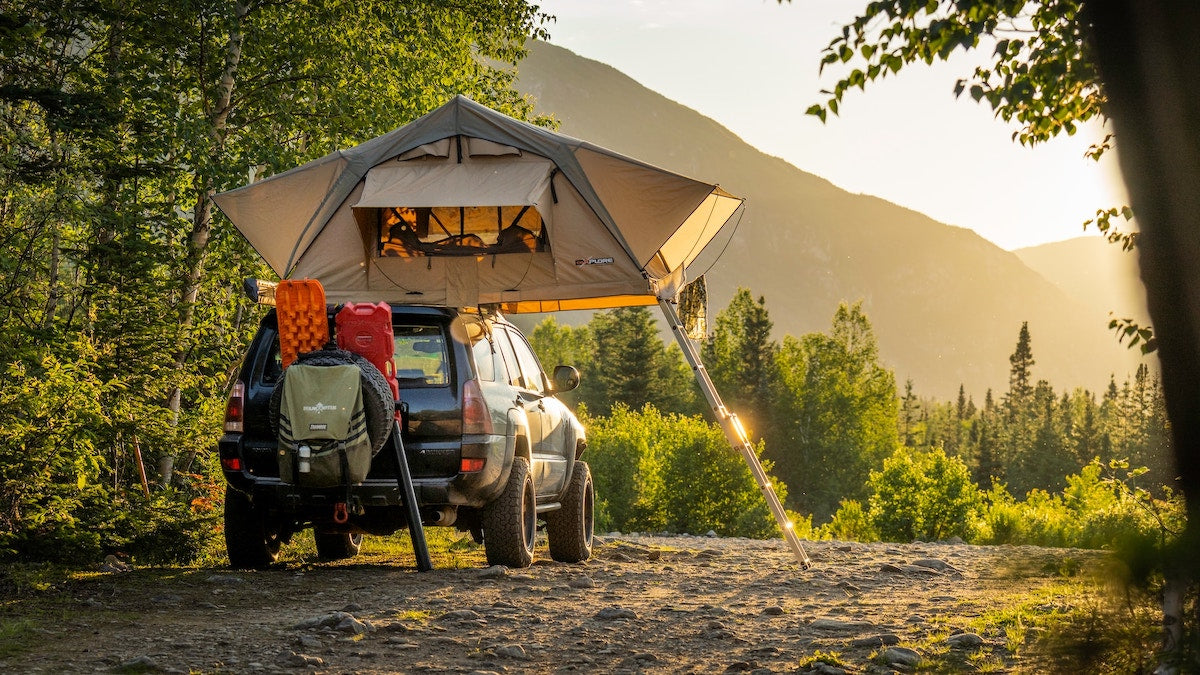Rooftop Tents: Are They Worth It?

Campers are constantly seeking innovative ways to enhance their outdoor experience. In recent years, rooftop tents have gained massive popularity among adventurers looking for an alternative to their standard camping setups.
These portable shelters mounted on top of cars can provide convenience, comfort, and an ”elevated” camping experience. However, like any other type of camping gear, rooftop tents come with a pros and cons list that is highly dependent on your specific situation.
In this article, we'll address some of the advantages and disadvantages of rooftop tents and also compare them to more traditional setups so you can decide if it’s the right call for your next expedition.
What are the benefits of rooftop tents?
 Photo by S. Widua on Unsplash
Photo by S. Widua on Unsplash
1. They offer mobility and versatility
When compared to other options, rooftop tents offer exceptional mobility in a couple of key ways. A roof-mounted tent essentially allows you to set up camp wherever you can drive your vehicle, thus making off-road camping even more accessible.
This setup can be much more versatile than a trailer or RV that requires a much larger footprint, special hookups, and oftentimes a specific camping site with a higher price per night.
Rooftop tents are also better suited for places that might not have a level tent site, or where the ground might be too rocky to make a clear spot to pitch a traditional tent. This makes them especially helpful for overland enthusiasts, allowing them to set up camp wherever their rigs can take them.
If you're into overlanding or want to build the ultimate 4x4 setup, then a rooftop tent might just be for you.
2. They’re quick and easy to set up
One of the greatest advantages of rooftop tents is their swift and effortless setup. Unlike traditional tents that require finding level ground and then assembling poles, unfolding tarps, and pounding stakes, a rooftop tent can be ready for use within minutes.
Most models feature a simple mechanism that allows for hassle-free, intuitive deployment that can be easily rigged up by one person. Some models even quite literally just pop up, saving valuable time and energy.
3. They offer comfort and protection
Sleeping in a rooftop tent provides a comfortable and literally elevated sleeping experience. These tents often come with thick foam or inflatable mattresses, ensuring a cozy night's sleep above the ground.
Furthermore, sleeping on top of your car provides campers with enhanced protection from insects, critters big and small, and ground moisture, allowing for a more peaceful, dry, and safe rest.
This extra sense of security that a rooftop tent offers is enough of a selling point for a lot of people.
4. They save space in your vehicle
One of the greatest advantages of the rooftop tent is how it will help you maximize space. They eliminate the need for bulky ground tents and free up valuable storage space inside your vehicle as well as create a smaller footprint at your campsite.
This additional space can be used for extra camping gear, food supplies, other recreational equipment, or even another person to take with you on your adventure.
These reasons make rooftop tents an excellent choice for those with limited storage capacity or who want a more simplified camping experience.
What are the disadvantages of rooftop tents?
 Photo by Brian Erickson on Unsplash
Photo by Brian Erickson on Unsplash
1. They’re pricey
By a long shot, rooftop tents tend to be much more expensive than traditional ground tents. The initial investment can be significant, especially for high-quality models. Most models range in price from about $1000 on the low end to roughly $5000. Some of the most luxurious tents can even go for $20,000 to $30,000!
So, why are rooftop tents so expensive? A big reason is the material and engineering that it takes to make them quick and easy to assemble. Additionally, you’ll likely need to purchase accessories such as roof racks or mounting systems to ensure a secure and stable setup, further increasing the overall cost.
In addition, there’s also the extra fuel cost, as mounting a rooftop tent on your car can decrease your mpg by up to 17% in some cases.
2. They’re not compatible with all vehicles
Rooftop tents require a compatible vehicle with a specific roof rack system for installation. Not all vehicles are suitable for rooftop tents, and retrofitting your vehicle may be necessary, adding to the overall expense. Moreover, the added weight of the rooftop tent may affect the vehicle's center of gravity and impact its handling, particularly a concern in windy conditions.
Overall, rooftop tents are not recommended for all vehicles. Make sure you do your due diligence as to your vehicle's capabilities before you purchase one.
3. You have to pack up camp anytime you go somewhere
While rooftop tents offer a quick and easy setup, they also come with some limitations and inconveniences.
Once the tent is set up, it's not convenient to move the vehicle unless you're willing to dismantle and pack up the tent each time. This restricts the flexibility for day trips or the ability to explore the surrounding area without taking down your entire campsite.
4. They have limited interior space and access
Although rooftop tents are designed to be space-efficient, their interior space is typically smaller compared to ground tents. This limited space may pose challenges, especially for taller individuals who may find it uncomfortable to move around or sit upright. It's crucial to consider the dimensions of a rooftop tent to ensure it can accommodate your needs.
Additionally, accessing the tent might prove difficult for some. So if you or someone you camp with has trouble with ladders or other mobility issues, a tent mounted on top of your car or truck might not be the most sensible.
 Photo by Jorgen Hendriksen on Unsplash
Photo by Jorgen Hendriksen on Unsplash
So, are rooftop tents worth it?
Rooftop tents definitely offer an exciting and convenient camping solution for adventurers seeking mobility, comfort, and a unique camping experience. They provide the freedom to explore remote destinations and offer quick and easy setup compared to traditional ground tents.
However, the cost, vehicle compatibility, setup limitations, and limited interior space issues are important factors to consider before investing in a rooftop tent. Careful evaluation of your specific camping needs and the pros and cons discussed here will help you determine if a rooftop tent is the right choice for your outdoor escapades.
Feature photo by Alfred Boivin



Leave a comment